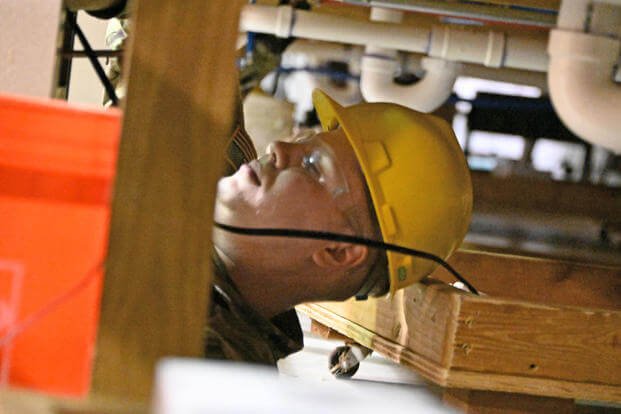Today's pipe-systems workers still come to the rescue when you have a clogged toilet or leaky pipe, but the profession has evolved to include technicians with high-tech tools who take pride in being environmental and public-safety guardians.
Plumbing jobs aren't as dirty as you might think, industry veterans point out, and they'll never be outsourced. In fact, if you're up for the challenge, opportunities abound.
"We're struggling with plumbing not being very sexy," said Paul Abrams, a spokesman for Roto-Rooter Inc. "There aren't enough plumbers to do all the work we get calls for. It's problematic now; in five years, it could be a crisis."
It's not just home-repair plumbing; new-building construction is booming. Overall, the industry needs 20% more workers a year, said Gerald Kennedy Jr., vice president of education for the Plumbing-Heating-Cooling Contractors National Association. "The opportunities are limitless."
A Variety of Jobs
Plumbing is part of a mechanical contracting category divided by the U.S. Department of Labor as pipe laying, plumbing, pipe fitting and steam fitting. Each specialty is defined as follows:
- Pipe layers lay pipe for drains, sewers, water mains and fuel lines. They also prepare and grade the trenches.
- Plumbers install and repair water, waste disposal, drainage and gas systems in homes, and commercial and industrial buildings. Plumbers also install bathtubs, showers, sinks, toilets, dishwashers and water heaters.
- Pipe fitters install and repair pipe systems used in manufacturing, electricity generation, and heating and cooling buildings. They also install automatic controls to regulate these systems.
- Steamfitters install pipe systems that move liquids or gases under high pressure.
- Sprinkler fitters install automatic fire sprinkler systems.
Do You Have the Skills?
You'll need to have basic knowledge of algebra and physics, as well as mechanical aptitude. "The most important ability is to visualize," said Jack Wilhelmi, who chairs the Career Development Committee for the Mechanical Contractors Association of America (MCAA). "I look at a set of drawings and see a building."
In addition to requiring candidates to pass drug tests and criminal background checks, residential service companies like Roto-Rooter emphasize strong interpersonal skills. Home-service plumbers must often calm the frantic homeowner who didn't anticipate the burst ceiling pipe, then explain what the problem is and what they'll do about it.
Uniforms, courtesy and leaving the home cleaner than when you came are vital, says Roger Peugeot, who owns a 54-year-old family business in Kansas City, Missouri, and trains willing apprentices who are still working at other jobs.
"We're looking for clean-cut kinds of people," he said. "We're training them to go out and be in people's homes."
Get Trained
Federally approved union or nonunion training programs take 4-5 years and teach you the basics of the trade before you decide which niche to pursue, says Kennedy. The trade organization offers scholarships that help pay for the annual cost of a training program, which can run around $1,500.
Many companies will also subsidize the cost for apprentices, who work full time during the day and attend school at night. Upon completion, apprentices become journeymen: All-around qualified generalists who may choose to specialize.
Moreover, MCAA has 28 student chapters in U.S. colleges and universities with programs in engineering and related disciplines. The Mechanical Contracting Education and Research Foundation often offers grants to help cover the cost of summer internships for members of these student chapters.
Roto-Rooter offers internal training programs and is actively recruiting. Abrams says trainees progress according to how quickly they learn. They attend basic plumbing classes and escort field trainers on rounds "to see what the job entails -- the good, the bad and the ugly," said Catherine Harris, Roto-Rooter management development director.
"We're trying to make them plumbers without waiting three years," Abrams said. "You could make $40,000 in your first year," plus full benefits.
Want to Know More About the Military?
Be sure to get the latest news about the U.S. military, as well as critical info about how to join and all the benefits of service. Subscribe to Military.com and receive customized updates delivered straight to your inbox.











